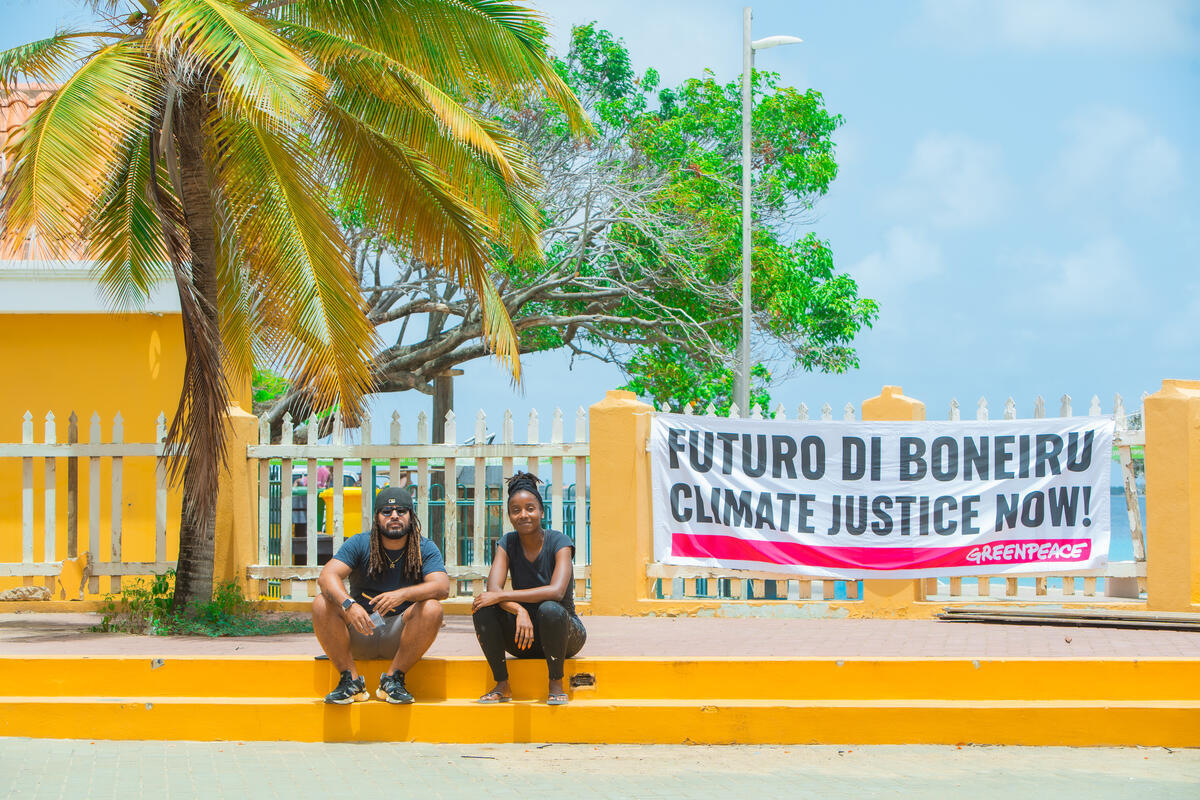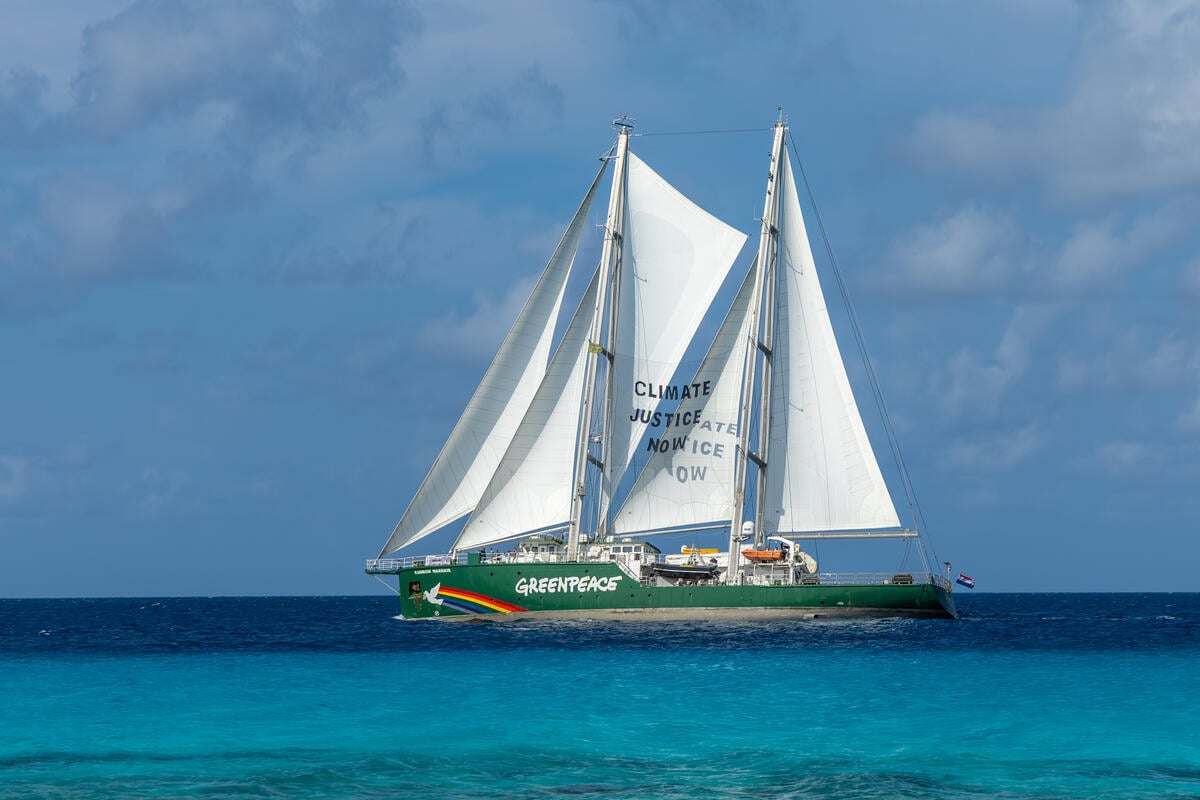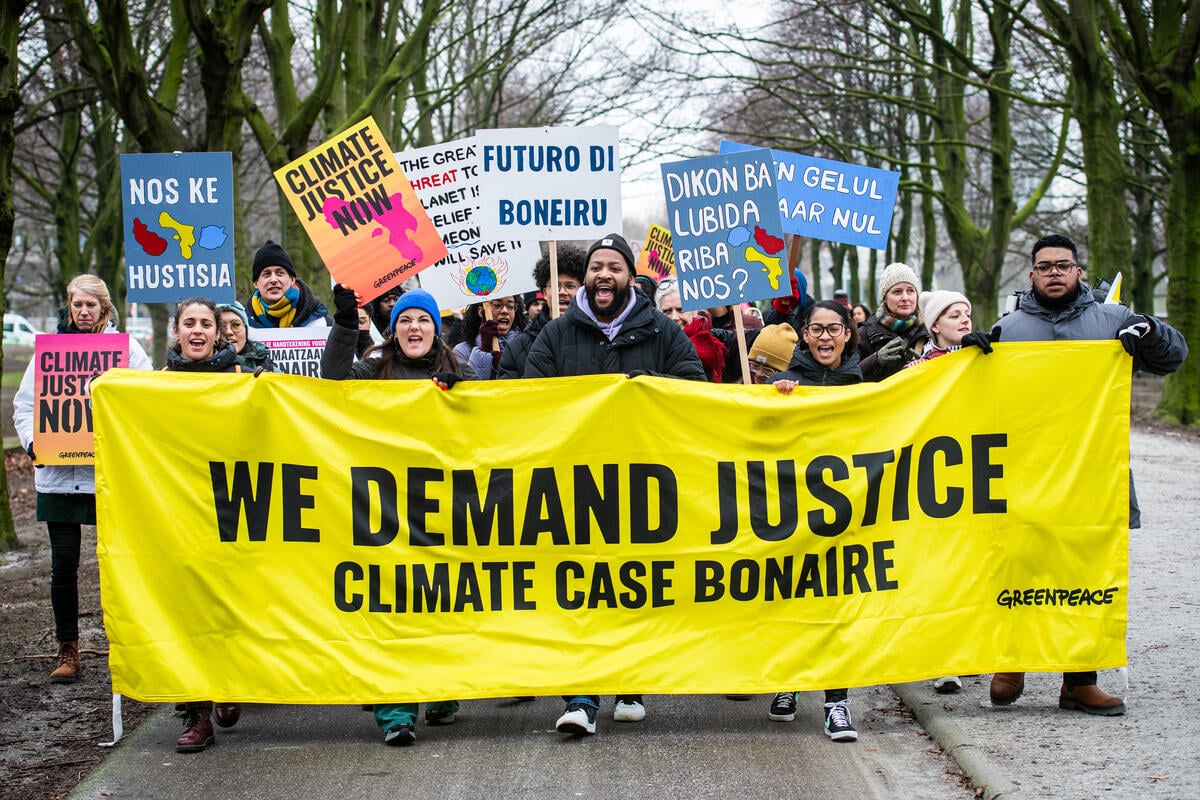On 7 and 8 October, the people of Bonaire will face the Dutch government in court. Together with Greenpeace Netherlands, residents of this Caribbean island are demanding what should already be guaranteed: protection from the impacts of the worsening climate crisis.
This case is about more than one island. It will be one of the first tests of the recent International Court of Justice (ICJ) Advisory Opinion, which confirmed that states have binding obligations under international law to prevent climate harm and protect human rights. How the Dutch courts interpret that advice will be closely watched around the world. The outcome could set a precedent for how governments everywhere are held accountable for their failure to address climate change.
Bonaire in the front row of the climate crisis
The Caribbean island of Bonaire is a former colony and current municipality of the Netherlands, but doesn’t enjoy the same protections as Europe-based municipalities. While billions are spent protecting the Dutch coast from rising seas, there is no comparable plan to protect Bonaire from rising sea levels, floods, heat, or stronger storms that its residents are already suffering.
Rising sea levels threaten homes and livelihoods. Coral reefs which sustain fishing and tourism are bleaching and dying. Extreme heat puts people’s health at risk. For many Bonairians, the question is not if climate change will disrupt their lives, but how much more destruction they will be forced to endure.
The injustice is stark. Like so many on the climate vulnerable, people in Bonaire have contributed least to the problem yet are among the hardest hit. And because poverty levels are much higher than in the European part of the Netherlands, they have fewer resources to cope.
Why this case matters
The Dutch government is committing an unlawful act by failing to take adequate climate action. The case is rooted in basic human rights: the right to life and livelihood, the right to cultural preservation, and the right to be protected without discrimination.
These rights are recognised in the European Convention on Human Rights and the International Covenant on Civil and Political Rights. The Dutch Supreme Court has already made clear in the Urgenda case that the government has a legal duty to cut emissions to protect human rights.
What makes the Bonaire case unique is that it is arguing for both mitigation and adaptation measures. Residents demand that the Netherlands cut CO2 emissions within its borders to net zero by 2040 – 10 years earlier than planned – as part of the global effort to limit warming to 1.5°C. At the same time, it must protect Bonaire by working with its residents to develop a robust adaptation plan.
The ICJ Advisory Opinion strengthens this case further. Earlier this year, the world’s highest court made it clear: states can no longer delay climate action. They have legal obligations to take all necessary measures to reduce emissions rapidly and to safeguard people, especially those in the most vulnerable situations, from climate impacts through adaptation measures. The Bonaire climate case will be one of the first opportunities for a national court to show what that means in practice for the Netherlands.
Double standards exposed
This lawsuit also highlights a double standard. In the European Netherlands, major flood defences and adaptation programmes have been underway for decades. Permanent assessments track the risks, and billions of euros are reserved for protection.
On Bonaire, to date, there’s no adaptation strategy, no concrete measures and funding that guarantee the protection of citizens against climate change impacts. In fact, until this case was filed, there had been no research undertaken on the effects of climate change in Bonaire. The message this sends is clear: some citizens are valued less than others. That is not only unjust, it is unlawful. Governments cannot pick and choose which people deserve protection.
Given Bonaire’s unique history, culture, and structural disadvantages, the state should be paying extra attention to the island’s protection. Anything less is discrimination.

Climate justice at stake
At its core, this case is about climate justice. It is about making sure that those who caused the problem do their fair share. It is about ensuring that states comply with their human rights obligations so that no one is left without protection from dangerous climate change.
It is also about self-determination. People on Bonaire have the right to decide their future, uphold their culture, and their livelihoods. Rising seas and dying reefs threaten not only homes and livelihoods, but also identity and heritage. The government has a duty to respect and protect that.
A test watched worldwide
Because the ICJ has spoken, the stakes are higher. Governments can no longer hide behind vague promises or long timelines. The law is clear: protect people now, cut emissions faster, and adapt fairly.
That is why communities, activists, civil society organisations and lawyers worldwide will be watching this case. If the court rules that the Dutch state must act, it will strengthen demands everywhere for governments to fulfil their obligations and prevent them from continuing to gamble with people’s lives.
Standing together
The people of Bonaire are not standing alone. In late September, the Rainbow Warrior was in Bonaire to show solidarity and amplify their voices. Tens of thousands of supporters across the Netherlands and beyond are backing this case.

Together, we are demanding that the government:
- Deliver its fair share to keep warming below 1.5°C and reduce Dutch CO₂ emissions with the ‘highest possible ambition’ of zero by 2040.
- Work with the people of Bonaire to create and implement a plan to protect them from the impacts of the climate crisis.
This is not only necessary for Bonaire. It is necessary for all of us. Wherever we live, we deserve protection from the climate crisis.
Delay means more homes lost, more livelihoods destroyed, more rights denied. But together, we can hold governments accountable and demand justice.
The people of Bonaire are standing up for their island — and for all of us. Now it’s our turn to stand with them.
In the words of the Bonaire plaintiffs: “Nos ta Boneiriano. Nos no ta pidi karidat. Nos ta eksigí hustisia.” (“We are Bonairians. We are not asking for charity. We are demanding justice”).
Source link
Greenpeace International www.greenpeace.org

